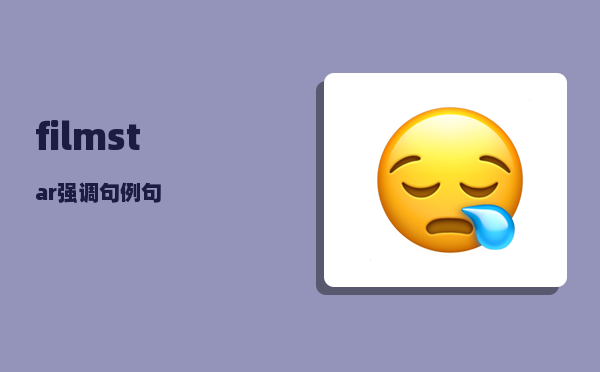filmstar_强调句例句
filmstar,强调句例句?
一、强调句的形式:

It is/was +被强调的成分+that/who/whom +句子的其余部分.
在这个句型中,it 没有意义,只是起到引出被强调部分的作用。
强调结构本身也没有意义,只是帮助改变句子的结构,使某一部分受到强调。
被强调的成分仅限于主语,宾语和状语。强调句的连词也只有that、who 和whom。当强调的部分是人,且为句子的主语时,连接词用“who”;当强调的部分是宾语,而且指人时,连接词用“whom”;其余情况都用“that”。
Eg:I saw him in the park yesterday.
我昨天在公园里看到他。
强调主语“我”:
It was I who saw him in the parkyesterday.
是我,昨天在公园里看到了他。
强调宾语“他”:
It was him whom I saw in the parkyesterday.
昨天我在公园里看到了他(“他”重读)。强调地点状语“在公园里”:
It was in the park that I saw himyesterday.
我昨天是在公园里看到他的。
强调时间状语“昨天”:
It was yesterday that I saw him in thepark.我是昨天,在公园里看到他的。
二、使用强调句时的注意事项
1.时态
原句中使用了表示过去的时态(一般过去时、过去将来时、过去进行时或过去完成时等等),改为强调句后都用It was…;原句中没有使用表示过去的时态,强调句都用It is …。
例如:
It is the computer that is doing manyjobs.计算机承担了很多的工作。
It was last year that the meeting started.
会议是在去年开始的。
It is him whom I will meet tomorrow.
我明天会遇到的是他。
2.一般疑问句的强调句型
把is/was 提到it 前面即可。
Eg:Is it in the same company that wework?
我们是在同一家公司上班吗?
3.特殊疑问句的强调句型
被强调部分(通常是疑问代词或疑问副词)+is/was +it +连接词+其他部分?Eg:When and where was it that youwere born?
你是何时何地出生的?
4.not …until …句型的强调句
把not 连同until 短语或从句一起提前,即It is/was not until +被强调部分+that +其他部分.
Eg:He didn’t notice me until I spoketo him.
→It was not until I spoke to him thathe noticed me. 直到我和他讲话,他才注意到我。
The boy didn't go to bed until hismother came back.
→It was not until his mother cameback that the boy went to bed.
直到妈妈回来,小男孩才上床睡觉。
5.强调时间、地点、原因或方式状语时,不可用when、where、why 或how,而仍用that。
例如:
It was at the beach that she saw himlying.她是在海滩上看到他躺着。
三、强调句和其他句型的区别
有时强调句型在形式上和定语从句、状语从句很相似,区别的方法是,如果去掉“It is/was”和连接词,原句依然成立,那么这个句子就是强调句。
例如:
1)It was at the gate that we first metlast year.强调句
It was the gate where we first met lastyear.定语从句
我们去年是在这个大门这里第一次遇到的。
2)It was at midnight that he got homeyesterday.强调句
It was midnight when he got homeyesterday.状语从句
他昨晚是半夜回到家的。
popular什么意思?
popular的意思是:
1.民众的;大众的Populareducationisoneofourmajorobjectives.民众教育是我们的主要目标之一。
2.孚众望的,得人心的,受欢迎的[(+with/among)]Sheisnowapopularfilmstar.她现在是很受欢迎的影星。
3.普通的,广为流传的,流行的Manyyoungpeoplelovepopularsongs.许多年轻人喜爱流行歌曲。
4.通俗的,大众化的;(价格)低廉的get的意思在这里是"变得","成为"于是getpopular的意思就是:变得得人心变得受欢迎变得广为流传变得流行了变得通俗了,变得大众化了(价格)变低了
过去将来时句子10句?
将来过去时:表示过去将来时间,
一、"would+动词原形"表示过去将来时
would+动词原形"构成过去将来时,常表示根据计划或安排即将发生的事.
He told me he would go to shenzhen他告诉我他将去深圳.
二、"was /were+going to+动词原形"表示过去将来时
:I was told that he was going to return home..有人告诉我他准备回家
It seemed as if it was going to rain.看来好像要下雨.
三:come,go,leave,arrive,start等严格按照时间表发生的表起止的动词可用过去进行时代替过去将来时.
She told me she was coming to see me.她告诉我她要来看我.
The train was leaving in two minutes那事火车将在两分钟离开.
.He said that he was coming the next day.
四) was/were about to + 不定式
I felt that something terrible was about to happen.我感觉坏事要发生了.
We were about to start when it began to rain.要下雨之前我们出发.
五.Was/were to + 不定式
按过去的计划、安排将在某个过去将来时间发生的事情
As I was to leave the next day,I went to bed early on Thursday evening
We were to have been in France now,but the flight was put off
Lily said that she would come to China .LILY曾说她要到中国来.
The report said that the film star would come to Henan next Sunday.报道说那位电影明星将在下周日来河南.
Mother said that she would do these things.I didn’t know if he would come.我不知道他是否会来.
They never knew that population would become a big problem.他们从来都不知道人口问题将会成为一个大问题.
She didn’t tell me where she would go.她没有告诉我她要去哪儿.
Betty said she would visit the Great Wall next Saturday.贝蒂说下周六她要去参观长城.妈妈说她会把那些事情做了.
He said he would come to see me.他说他要来看我.
He told me he would go to Beijing.他告诉我他将去北京
She said she was going to start off at once.她说她将立即出发.
I was told that he was going to return home.有人告诉我他准备回家
He said the train was leaving at six the next morning.他说火车将于第二天早晨六点离开.
She told me she was coming to see me.她告诉我她要来看我
It seemed as if it was going to rain.看来好像要下雨.
I didn’t know when she would come,but when she came I would let you know.我不知道她什么时候来,但她来了我会告诉你.
The teacher said that it would be very difficult to make progress if I didn’t work hard.老师说,如果我不努力学习的话,就很难取得进步.
I didn''t know if he would come.=I didn''t know if he was going to come.我不知道他是否会来.
She was sixty-six.In three years,she would be sixty-nine.她66岁了.三年后,她是69岁.
She told us that she would not go with us,if it rained.她告诉我们,如果下雨,她就不和我们一起去了.
I didn''t know how to do it.What would be their ideas?我不知如何去做,他们会有什么想法呢?
This door wouldn't open.这扇门老是打不开.
Whenever he had time,he would do some reading.他一有时间,总是看书.I would play with him when was a child.当我还是孩童时,总是和他一起玩.
star的反义词?
star没有反义词。
The sun went down and the stars peeped out .太阳下山了,繁星隐约出现。
He is understudying the famous film star .他在为那位著名影星充当替角。
The official associates were scattered like stars ...僚属星散。
He has got the star role in the new film .他将主演这部新片子。
It will be folly to curse your stars .咒诅自己的命运是愚蠢的。
The critical stars had not yet risen .最要紧的是星辰尚未升起。
He was spider kelly's star pupil .他是斯拜德凯利的得意门生。
There is an attraction among these stars .在这些恒星之间存在着一个引力。
过去分词短语结构?
过去分词➕介词
(1)过去分词短语发生的动作在谓语动词之前;
(2)短语中的过去分词与逻辑主语之间是被动关系;
如:
I saw the ball thrown into the garden.
我看见球被扔进了花园。
过去分词短语可以表达下列四种意思:
㈠方法或活动方式,
如:
He walked up and down, lost in thought.
I sat before the desk until after mid-night, absorbed in writing.
Surrounded by a host of fans, the film star left the airport excitedly.
㈡原因,如:
Greatly disappointed, some staff decided to leave the place.
Taken by surprise, the enemy surrendered.
㈢时间,如:
Born and bred in a turbulent age, the older generation of people experienced all sorts of hardships.
Thrown to the floor, the boy regained his footing a few minutes later.
㈣条件,
如:
Given more time, the slow learners would have done better.
Criticised by someone else, Tony would not have flared up like that.
除了直接修饰动词之外,过去分词或短语也可以和连词合组成短语,表示下列意思:
⒈由 when, whenever, while, until 等连词引导,表示“ 时间”,
如:
When asked about his previous job, Bill said he had been a motor mechanic.
● Susan seldom speaks in class until spoken to.
⒉由 where, wherever 连词引导,表示“地点”,如:
Mosquitoes should be completely exterminated where found.
Retirees in good health should be invited to return to work wherever needed.
⒊由 if, unless 引导,表示“条件”,如:
If kept for too long, some medicines will lose their effectiveness.
We have made a point of not attacking unless attacked.



